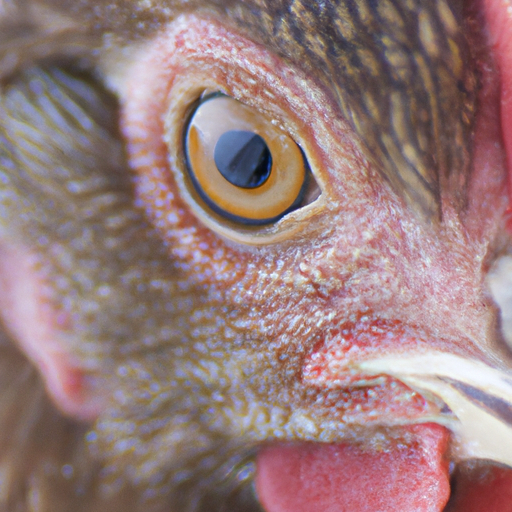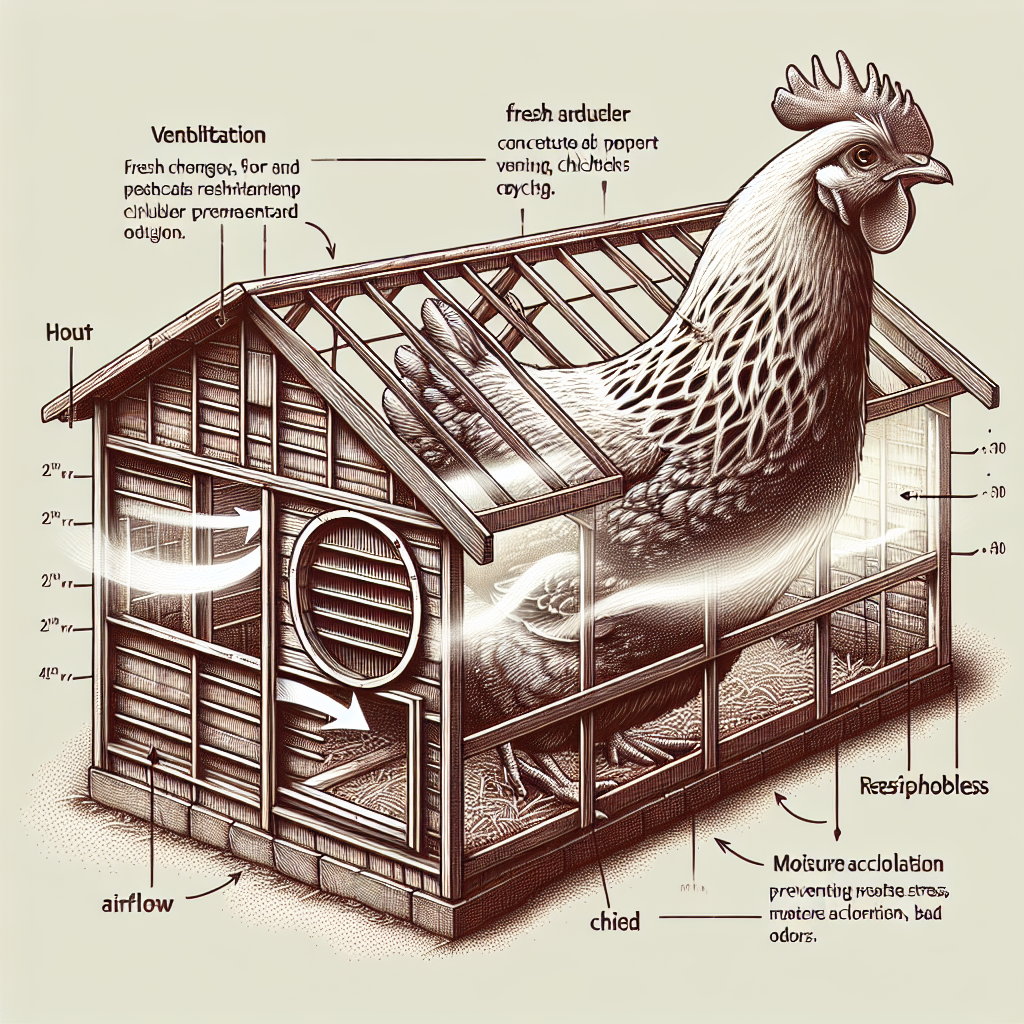In the article “How Do I Identify And Manage Stress In Chickens?”, you will discover the key signs to look out for when it comes to identifying stress in your chickens, as well as effective strategies for managing and reducing their stress levels. Keeping your feathered friends happy and stress-free is vital for their overall health and well-being. So, get ready to gain some valuable insights into understanding and caring for your chickens’ stress levels, creating a peaceful and harmonious poultry paradise.
Understanding the Signs of Stress
Stress in chickens can manifest itself in various ways, both physically and behaviorally. By being able to identify these signs, you can take appropriate measures to alleviate stress and promote the overall well-being of your flock.
Physical signs of stress in chickens
Physical signs of stress in chickens can include changes in body language and appearance. Look out for rapid breathing, fluffed feathers, and a hunched posture. Additionally, stressed chickens may experience weight loss, decreased egg production, and reduced appetite.
Behavioral signs of stress in chickens
Behavioral signs of stress in chickens are often easier to recognize. Stressed chickens may exhibit excessive feather pecking, aggression towards other flock members, or even self-destructive behaviors such as feather plucking. They may also become more vocal or display signs of depression, such as decreased activity levels and social withdrawal.
Common Causes of Stress in Chickens
To effectively manage stress in chickens, it is essential to understand and address the underlying causes. Here are some common factors that can contribute to stress in chickens:
Overcrowding in the coop
Overcrowding can lead to heightened stress levels among chickens. When there is limited space, chickens are more likely to engage in aggressive behaviors and experience increased competition for resources such as food, water, and nesting areas.
Lack of space and limited movement
Chickens need ample space to move and engage in natural behaviors. Insufficient space limits their ability to stretch their wings, roost comfortably, and exhibit their natural foraging instincts. Lack of movement can contribute to muscle weakness and overall stress.
Loud noises and sudden disturbances
Chickens are sensitive to loud and sudden noises, which can startle and stress them. Common sources of loud noises include construction work, fireworks, and even excessive human activities near the coop.
Predator presence and fear
Fear of predators can cause significant stress in chickens. Even if there is no immediate threat, the mere presence of predators or signs of their presence can trigger stress responses in chickens. This stress can be further heightened if the coop or run does not provide adequate protection.
Inadequate nutrition and hydration
A lack of proper nutrition and hydration can lead to stress and compromised immune systems in chickens. It is crucial to provide a well-balanced diet and ensure that chickens have access to clean water at all times.
Inconsistent lighting and temperature
Fluctuations in lighting and temperature can have a detrimental impact on chickens’ well-being. Inconsistent lighting cycles disrupt their natural circadian rhythms, while extreme temperature variations can lead to discomfort and stress.
Social hierarchy and pecking order
Establishing a social hierarchy is natural among chickens. However, excessive aggression and bullying within the flock can cause stress among subordinate individuals. Inadequate space and resources can exacerbate this problem.
Health issues and diseases
Chickens suffering from health issues or diseases may experience significant stress. Illnesses, parasites, and infections can cause physical discomfort and pain, leading to behavioral changes and stress.
Mitigating Stress Factors
To create a stress-free environment for your chickens, it is crucial to address the various stress factors they may face. Here are some strategies to mitigate stress:
Providing sufficient space and ventilation
Ensure that your chickens have enough space in their coop and run. Optimal spacing allows them to move freely and exhibit natural behaviors. Adequate ventilation is also essential to maintain good air quality and reduce ammonia buildup, which can cause respiratory problems and stress.
Maintaining a clean and comfortable environment
Regularly clean the coop and remove any waste or debris. A dirty environment can harbor bacteria and parasites, leading to health issues and stress. Provide comfortable bedding and nesting areas, ensuring that they remain dry and warm.
Implementing environmental enrichments
Enrich the chickens’ environment by providing items such as perches, dust baths, and objects for pecking and exploring. This stimulates natural behaviors and prevents boredom, reducing stress levels.
Ensuring proper nutrition and hydration
Feed your chickens a well-balanced diet that meets their nutritional needs. Supplement their diet with greens, vegetables, and treats. Fresh, clean water should always be available to prevent dehydration and stress.
Minimizing noise and external disturbances
Take measures to minimize loud noises and sudden disturbances near the coop, especially during sensitive times such as nighttime. Use noise-dampening materials, such as insulation, if necessary. Limit human activities around the coop to reduce stress.
Offering a safe and secure coop
Ensure that the coop and run are predator-proof, providing a safe and secure environment for your chickens. Regularly inspect and reinforce fencing, locks, and other protective measures to minimize the risk of predation.
Monitoring flock dynamics and social interactions
Observe your flock regularly and intervene if excessive aggression or bullying is observed. Provide sufficient space and resources to minimize conflict, allowing chickens to establish a balanced pecking order.
Implementing regular health check-ups
Schedule regular visits with a poultry veterinarian to monitor your flock’s health. Preventive measures such as vaccinations and parasite control can help reduce the risk of diseases and minimize stress.
Implementing Stress Management Strategies
Beyond mitigating stress factors, implementing stress management strategies can go a long way in promoting the well-being of your chickens. Here are some techniques to consider:
Establishing a routine and consistency
Chickens thrive on routine and predictability. Establish regular feeding times, maintain consistent lighting cycles, and follow a set daily routine. This helps reduce stress by providing a sense of stability and security.
Using positive reinforcement training
Positive reinforcement training can be used to encourage desired behaviors and reduce stress. Reward chickens with treats or praise when they exhibit calm behavior or engage in activities that promote their well-being. This creates a positive association and reduces fear or anxiety.
Implementing stress-relieving activities
Introduce stress-relieving activities to help chickens relax and alleviate stress. This can include providing toys or objects for pecking, hanging treats for them to jump and grab, or creating a dedicated dust bath area for them to indulge in their natural instincts.
Promoting natural behaviors and foraging
Allow chickens to engage in natural behaviors, such as scratching, pecking, and foraging. Designate areas within the run or free-range space where they can seek out insects, plants, and other natural food sources. This provides mental and physical stimulation, reducing stress.
Introducing calming stimuli and distractions
Calming stimuli, such as soothing music or background noise, can help create a calm and relaxed environment for chickens. You can play gentle nature sounds or classical music near the coop or run. Distractions, such as hanging shiny objects or providing visual barriers, can help redirect attention away from potential stressors.
Separating aggressive or dominant individuals
If certain individuals within the flock consistently display aggressive or dominant behavior, consider separating them temporarily or permanently. This allows more vulnerable chickens to live in a less stressful environment.
Providing safe retreat areas
Create safe retreat areas within the coop and run where chickens can escape from potential stressors. This can include providing hiding spots, elevated perches, or separate enclosed spaces for individuals to retreat to when they feel anxious or overwhelmed.
Monitoring and reducing exposure to predators
Continuously monitor and mitigate any risks related to predators. Secure the coop with strong fencing, install motion-activated lights, and consider using predator deterrents such as noise-making devices or motion-sensor sprinklers to discourage predators from approaching.
The Role of Human Interaction
Human interaction plays a crucial role in managing stress in chickens. By fostering trust and providing positive experiences, you can help reduce stress and build a strong bond with your flock.
Handling and interacting with chickens
Handle chickens gently and confidently, avoiding sudden movements or unnecessary stressors. Approach them slowly, allowing them to become familiar with your presence. Gradually increase handling and physical contact while respecting their individual comfort levels.
Building trust and familiarity
Spend time around your chickens regularly, engaging in calm and non-threatening activities. This helps build trust and familiarity and reduces the fear or stress associated with human presence.
Offering treats and rewards
Reward chickens with treats and rewards during interactions to reinforce positive associations. Use treats that chickens enjoy, such as mealworms or fresh greens. This promotes trust and encourages them to approach and interact with you willingly.
Minimizing chaotic or stressful interactions
Avoid chaotic or stressful interactions with your chickens, such as chasing or handling them roughly. Loud noises, sudden movements, or being crowded can cause fear and stress. Opt for calm and low-stress interactions.
Recognizing individual chicken preferences
Each chicken has its own preferences and comfort levels when it comes to human interaction. Learn to recognize and respect these individual preferences. Some chickens may enjoy being held or petted, while others may prefer to observe from a distance.
Maintaining a calm and relaxed demeanor
Chickens are sensitive to their humans’ emotions. By maintaining a calm and relaxed demeanor, you can help create a calm atmosphere for your flock. Avoid displaying signs of stress or frustration during interactions.
Seeking Veterinary Advice
While many stress-related issues can be managed with proper care and preventive measures, it is crucial to seek professional guidance when necessary.
Recognizing signs of serious stress-related disorders
Be vigilant for signs of serious stress-related disorders in your chickens. These can include persistent lethargy, loss of appetite, rapid weight loss, difficulty breathing, or abnormal behavior patterns. If you notice any concerning symptoms, consult a poultry veterinarian promptly.
Consulting a poultry veterinarian
For expert advice and diagnosis, consult a poultry veterinarian experienced in chicken care. They can help identify the underlying causes of stress and provide appropriate treatment options.
Obtaining professional guidance and treatment
A poultry veterinarian can guide you in implementing specific treatments or interventions to manage stress-related issues. They may recommend medications or supplements to support your chickens’ well-being.
Understanding medication options and dosages
If medication is prescribed by a poultry veterinarian, it is crucial to understand the dosage, administration, and potential side effects. Follow all instructions carefully and monitor your chickens closely during the treatment period.
Preventing Future Stress Episodes
Prevention is key to minimizing stress episodes in your flock. By adopting proactive measures, you can create a more stress-free environment for your chickens.
Performing regular coop and environmental checks
Regularly inspect the coop and run for any potential hazards or maintenance needs. Check for damaged fencing, secure locks, and signs of wear and tear. Ensure that ventilation, lighting, and temperature-control systems are in good working order.
Adopting preventive health measures
Take preventive measures to minimize the risk of diseases and health issues. This includes vaccinating your flock against common diseases, implementing parasite control protocols, and practicing good biosecurity measures.
Maintaining a balanced flock population
Having an appropriate flock size is crucial to prevent overcrowding and excessive aggression. Consider the available coop space and resources when adding new chickens to your flock. Avoid introducing new birds if space is limited or if aggression issues are unresolved.
Promoting a stress-free rehoming process
When rehoming chickens or introducing new flock members, take steps to minimize stress. Gradually introduce unfamiliar chickens, providing separate spaces in their initial interactions and ensuring access to food, water, and shelter.
Planning and preparing for changes in routine
Chickens thrive on routine, so it is essential to plan and prepare for any changes in their daily routine. When making alterations, such as feeding times or lighting cycles, introduce them gradually to minimize stress.
Ensuring availability of proper nutrition and water
Maintaining a well-balanced diet with access to clean water is fundamental for preventing stress. Regularly evaluate your chickens’ nutritional needs and adjust their diet accordingly. Monitor water sources to ensure cleanliness and availability.
Stress Relief and Relaxation Techniques
Implementing stress relief and relaxation techniques can significantly contribute to reducing stress levels in your flock and promoting their general well-being.
Creating a calm and peaceful environment
Create a calm and peaceful environment for your chickens by minimizing noise and disturbances. Provide areas of shade and tranquility, away from potential stressors, such as neighboring animals or loud machinery.
Playing soothing music or sounds
Playing soothing music or natural sounds, such as gentle rainfall or bird songs, near the coop can have a calming effect on chickens. This can help mask any sudden or loud noises from outside sources.
Providing dust baths and shade
Dust baths are not only important for maintaining good hygiene but also for reducing stress. Offer a designated area filled with dust or fine sand where chickens can indulge in their natural behavior, keeping themselves clean and free of parasites. Additionally, provide adequate shade to protect chickens from excessive heat, which can induce stress.
Offering herbal supplements or natural remedies
Certain herbs and natural remedies are known for their calming properties. Consult with a poultry veterinarian or experienced chicken keepers to identify safe options for your flock. Chamomile, lavender, or Valerian are some examples known for their potential stress-reducing effects.
Utilizing massage and gentle handling
Gentle massage or handling techniques can help calm and relax chickens. Identifying your chickens’ preferred areas to be touched and applying light pressure or strokes can be soothing and comforting for them.
Allowing sufficient rest and sleep
Ensure that your chickens have access to a safe and quiet area where they can rest and sleep undisturbed. Protect them from bright lights, excessive noise, and any other factors that could disrupt their sleep patterns.
Providing access to fresh air and sunlight
Fresh air and natural sunlight have numerous benefits for chickens’ well-being. Ensure that your coop is well-ventilated, allowing for proper airflow. Also, provide access to outdoor areas where chickens can bask in sunlight, which promotes vitamin D synthesis and overall health.
Monitoring and Evaluating Stress Levels
Regular monitoring and evaluation of stress levels are crucial to maintaining the health and happiness of your flock.
Regularly observing chicken behavior and body language
Observe your chickens’ behavior and body language on a daily basis. Look for any changes in their demeanor, activity levels, or social interactions. Note any signs of stress, such as excessive aggression, apathy, or changes in eating or drinking behavior.
Tracking changes in egg production and quality
Monitor egg production to identify any changes that may indicate stress. Reduced egg production, smaller or misshapen eggs, or changes in eggshell quality could be signs of underlying stressors.
Assessing overall health and well-being
Regularly assess the overall health and well-being of your chickens. Look for any signs of illness, injury, or discomfort. If you suspect any health issues, consult a poultry veterinarian promptly.
Utilizing stress-measuring tools and indicators
Certain tools and indicators can help measure stress levels in chickens more objectively. These can include heart rate monitors, body temperature measurement, hormone analysis, or even behavioral observation systems designed specifically for poultry.
Consulting with experienced chicken keepers
Engaging with experienced chicken keepers and joining online forums or local poultry groups can provide valuable insights into monitoring and managing stress in chickens. Discussing your observations and concerns with experienced individuals can help you gain a broader perspective.
Understanding the impact of external factors
Be mindful of external factors that can influence stress in chickens. Weather conditions, seasonal changes, or nearby construction activities can all contribute to elevated stress levels. Take these factors into consideration when evaluating stress in your flock.
Conclusion
Understanding and managing stress in chickens is essential for safeguarding their health and promoting a harmonious flock environment. By recognizing the physical and behavioral signs of stress, identifying its causes, and implementing appropriate stress relief strategies, you can contribute to the overall well-being and happiness of your chickens. Creating a stress-free environment and maintaining positive human interactions are paramount in ensuring the best possible life for your feathered friends. Remember to seek professional advice when necessary and to continuously monitor and evaluate stress levels to prevent future episodes. By prioritizing stress management, you will be rewarded with a thriving and content flock.




